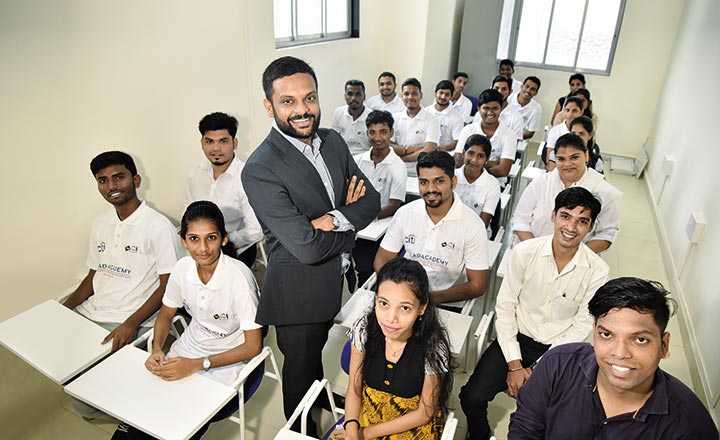Sanjay Singh, the 21-year-old son of the owner of a cycle repair shop, met with a serious, life-altering bus accident in 2014. Although the incident continues to haunt him in the form of a constant pain in his left leg, he hopes to make it big in life. According to him, EduBridge, a skill development and vocational training organisation, was a “blessing in disguise”. It was a chance encounter at a local fest in Pali, Jodhpur, where he found out about the organisation. In hopes of securing a good job, he immediately enrolled for a two-month training course related to banking and finance.
A sales executive at Paytm today, he works towards bringing local retailers as Paytm partners on board. “I’m earning a salary of Rs.14,500 per month as well as a commission, depending on the partners I sign on,” Singh says proudly. EduBridge is proving to be a catalyst of change for many like Singh.
In an attempt to marry both social and commercial needs, Girish Singhania set up EduBridge in July 2010. Coming from an orthodox Marwadi family, starting his own business was always at the back of his mind. The IIM-Bangalore graduate quit his job with Edelweiss Financial Services as an investment banker in September 2009 to set up EduBridge. “I’ve always felt that for-profit organisations help in bringing about more sustainability and efficiency compared with NGOs,” justifies the founder.
The company’s key objective is to identify unemployed youth from low-income backgrounds, provide them relevant skills and change their mindset to make them employable. There is, however, an eligibility criteria: the students must fall in the age group of 18-25 years, they either should be undergoing formal education in college or be dropouts — having passed at least the 10th grade, and should belong to households with an average monthly income of less than Rs.10,000.
Currently, EduBridge has over 70 training centres, called EduBridge Career Academies, across the country either in small towns or on the outskirts of cities such as Bengaluru, Chennai, Mumbai and Pune. In Mumbai and Pune, it has four to five centres each; in Bengaluru, it has two; and in the other tier-II, III and IV cities, the company has one centre apiece — a model it refers to as TeamBridge.

In addition to these academies, it also ties up with schools and colleges to train students on campus. The company refers to this model as EmployBridge. At present, it has tie-ups with over 50 schools and colleges, through which about 10,000 students have been trained across states.
SkillsBridge is another model aimed at corporates (belonging to various sectors) to help them train their existing, entry-level staff, working in the salary bracket of Rs.8,000-Rs.12,000, for skills such as customer service and English speaking. “Since we already have training centres across the country, entry-level employees can be trained in their respective locations, which would be difficult for the company to do otherwise,” explains Singhania. For this model, the company has currently tied up with over 40-50 companies that include Godrej Consumer Products, Mahindra Finance and Wellness Forever.
Hunters and seekers
It all started in 2007 when Singhania, working with P&G Mumbai, was looking to expand to rural areas. This was challenging since he was either unable to hire people, or even if he did, they lacked the basic skills. To understand the rural markets better, he started travelling on weekends to villages in Gujarat, Maharashtra, Tamil Nadu, Karnataka and Andhra Pradesh. A year later, after completing 100 interviews in about 100 villages across these five states, he realised that people wanted jobs and companies wanted people, but there was no one to bridge this gap. Singhania decided to do this through education, setting up EduBridge as a result.
Currently, it focuses only on the service sector including retail, Information Technology Enabled Services (ITES) and Banking, Financial services and Insurance (BFSI) to name a few — in short, sectors with jobs in the sales and operations department.
But why focus only on jobs in the organised sector? This may be explained by the company’s larger vision: the impact of the training and the way EduBridge can manage to transform an individual. “There is still an aspirational value attached to white-collar jobs. Even today, parents proudly say, meri beti AC office mein kaam karti hai; mera beta bank mein jaata hai (My daughter works in an air-conditioned office; my son works in a bank). Moreover, these white-collar jobs are part of the organised sector employment, where it is a lot easier for us to help these individuals kickstart their career,” he explains. With blue-collar jobs, people have to find their own livelihood, whereas EduBridge is trying to get that livelihood for the students.
Path to success
The training programme for TeamBridge (their flagship programme) includes intensive training for everything that a candidate needs to know about working in a corporate environment. The two-three month course costs between Rs.500-Rs.1,500 per student. The first month is for a foundation course, covering basic communication in English, personality development and the development of analytical skills. “The remaining months are dedicated towards specialised training for specific jobs in the field of their choice. The specialisation is different for each course, and all our courses align with qualification packs,” says Anand Natarajan, head (corporate relations), EduBridge. For instance, if the individual aims for the BPO sector, communication skills would be emphasised. “We work with recruiters to develop particular curricula for particular sectors for our students to ensure they are absolutely industry-ready,” Singhania adds.
To ensure consistent quality, they use the trainer-led log management system — something that is followed across all centres in India. Today, there are over 175 trainers directly under its payroll on a full-time basis. They are usually locals who are trained separately by EduBridge. “By the end of this year, we will have over 200 full-time trainers and about 100 trainers on a part-time basis,” says Utsav Kheria, head (operations), EduBridge.
A team of 30-35 members is dedicated to identify job opportunities for their students. Singhania adds, “Before training begins, we find out what kind of job they are looking for and work around the training programme accordingly.” The team ensures that each candidate gets at least five interviews for entry-level jobs. The maximum demand is for jobs related to banking and finance.

Often, there are students who do not wish to move to big cities for jobs. Singhania’s team then looks for jobs in and around their desired locations. But what about their placement rate? The founder explains, “Take a base of 100 students. Around 10-15 drop out every year for various reasons. Of the 85 who write the final assessment, 10 refuse jobs [for various reasons]. Of the remaining 75, 67 get placed — which translates to about 90%.”
Singhania emphasises on the fact that mindset is equally important for these students as they come from backgrounds where they aren’t aware of the choices they have, and hence, need a great deal of counselling. As part of the programme, there are five mandatory counselling sessions to make them aware about the importance of discipline. “These are students who are not used to working for eight hours straight,” Singhania explains.
Company collabs
EduBridge has four distinct forms of revenue streams — government funds, two sources of corporate funds: the CSR and HR budgets, and the fee charged on students outside of these schemes. As part of its tie-ups with the government, the students are placed under various schemes, including the National Rural Livelihoods Mission and the National Urban Livelihoods Mission. In most cases, the training fee is subsidised by governments or corporates, and students have to pay just a minimum amount. More often than not, as part of the government schemes, training is completely free for them.
It also partners with corporates’ CSR budgets to set up joint training centres, which it takes up on rent. According to Kheria, the approximate cost of setting up these centres is Rs.7 lakh to Rs.10 lakh. Some of these corporates include Citibank, Reliance, Ambuja Cement and Capgemini. Kumar Anurag Pratap, CSR leader, Capgemini Technology Services, says, “Over the years, EduBridge has mastered the art of articulating the aspirations of youth and built a team that can relate with them. This makes the task of skilling youth and finding jobs, post the training, easier.”
In its collaboration with corporate HRs, EduBridge is asked to custom-train students as per the corporates’ needs, with a promise to hire a certain number of students. “Through the HR tie-ups with corporates, we have placed over 30,000 candidates till date,” adds Natarajan.
As of now, it has over 300 regular recruiting partners including, Reliance Retail, Shoppers stop, Megamart and Big Bazaar. In the ITES section, it has partnered with Tech Mahindra, Aegis and Hinduja Global Solutions, and for BFSI, some of its partners include Kotak Mahindra Bank, Yes Bank, IDFC Bank, ICICI Lombard and Paytm to name a few.
The route uphill
Singhania started EduBridge with an initial investment of Rs.15 lakh to Rs.20 lakh and has been expanding ever since. In FY17, it clocked revenue of Rs.19 crore and its estimated revenue for FY18 is approximately Rs.38 crore. Currently, 70% of its revenue comes from TeamBridge, and the rest from EmployBridge and SkillsBridge. For TeamBridge alone, the number of students rose from 12,000 students in FY16 to 20,000 in FY17. The company is expecting to train 45,000 students in FY18.
In 2010, EduBridge raised Rs.2.5 crore in debt from the National Skill Development Corporation and in 2012, it raised about Rs.1.3 crore from Acumen, which was keen in investing in the skill development space. “We scanned the market to evaluate all the skill development players in the space. For us, two things were critical — placement rate and the stickiness of the employees being placed,” explains Karuna Jain, portfolio associate director, Acumen. Last year in February, EduBridge raised Rs.16 crore, where Acumen also participated, with Insitor Impact Fund as the lead investor. “EduBridge sees itself as a lifetime partner for the people it trains, not just as service provider for government or corporates,” Jain adds.
EduBridge is now setting up an exclusive online job portal to ensure a smoother recruitment process. By FY18, EduBridge will have 100 training centres in all, and by FY19, it expects to have 25 new ones. At present, the company has about 400-500 students who graduate from each batch.
The path is still fraught with challenges. Kheria says, “Quality manpower and standardising systems and processes across vastly fluctuating and dispersed set-ups are some of the obstacles we have faced in the past and continue to, even now.” Even so, as Pratap of Capgemini believes that EduBridge’s success rate is far better than the industry average. “This is possible because it has invested on the faculty, training facilities, job-readiness linked curricula and industry interface.”
From a company that Singhania started out of his home, today it has 400 on its rolls. Given the humungous opportunity ahead, EduBridge could well see the number double in the years to come as it gets better in this game of skill.











